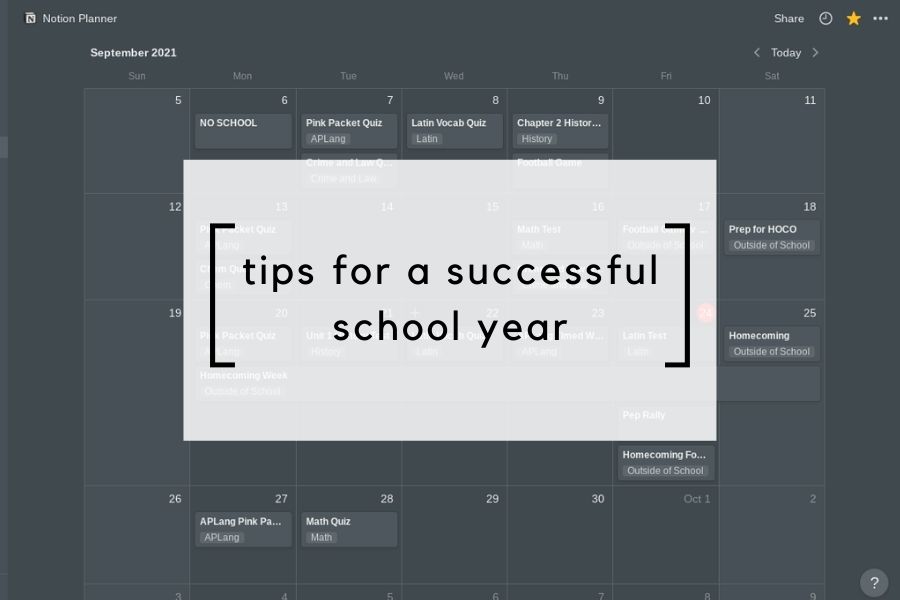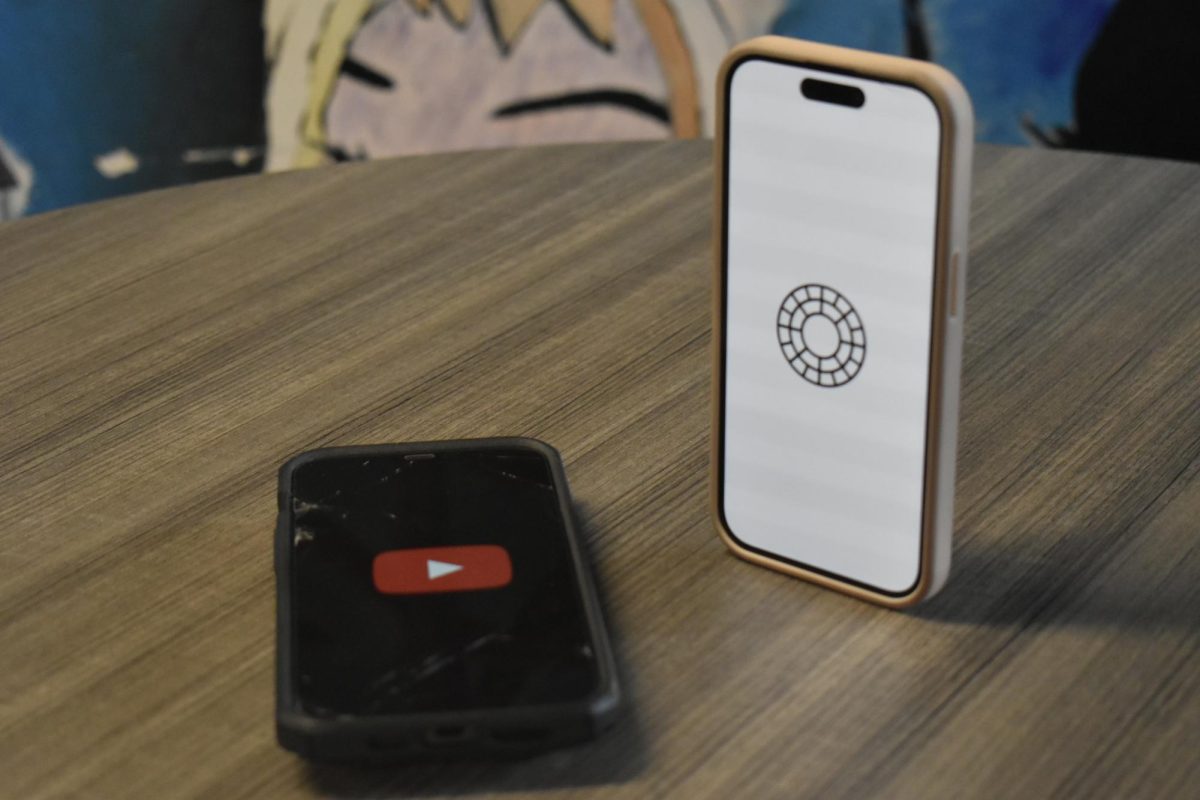Test, after test, after test. This has been the reality for students over the last few weeks. Two months into school, students are still struggling to get into the groove of things. Students are finding themselves uncomfortable with test scores, trying to balance class workloads and getting stuck on homework for hours on end, all of which are causing them to become more overwhelmed.ô
Believe me, I get it. I would be lying if I said I hadnãt worked until 9:00 p.m. trying to finish my math homework. Although we may find ourselves struggling, there is hope for us. Take a look at our top five tips to succeed this year:ô
1. Keep everything organized!ô
One of the greatest problems students like me are facing is organization. Papers get lost, due dates are confusing and time management is horrible. For these reasons, I would recommend a planner. Online or virtual, planners have always been a staple in my school supply list. Currently, my favorite is Blue Skyãs Daily/Monthly Academic Planner. However, for those who arenãt looking to buy a physical planner, I would recommend a site called Notion.ô
Notion is a workspace-style app free of charge for personal use. I have been a user for the last month while on the hunt for an easy-to-navigate online planner. However, the online extension can be used as more than just a planner. It has the option for task lists, journals, content calendars and more. One of my favorite features in Notion is the option to make your own templates for pages. I have already used this feature to make a bell schedule page and calendar. I have already seen improvementsô in my prioritization while working with Notion and have learned to put my most important assignments first.ô
ãFirst things first.ã Weãve all heard this phrase; It means we have to get our priorities straight. Unfortunately, itãs not always that easyãespecially with school. Students have a wide array of classes which makes it difficult to realize what needs to come first. A good rule of thumb that I use: finish the small things first. Purdue University Global also agrees with this mindset for their students, listing it as the third most important tip in their article ãTime Management Tips for Busy College Students.ã Personally, I have seen how finishing small assignments helps me transition into a productive mindset before working on larger and more difficult tasks.ô
2. Find your favorite study method
Iãll be real with you, studying sucks. I used to spend hours on end exhausted from math and history with little to no breaks. Recently, I have been slowly implementing new studying habits into my routines. One of these new methods being the Pomodoro Technique.ô
Developed by university student Francesco Cirillo in the late 1980s, the Pomodoro technique was created for those of us with shorter attention spans. The technique, whose name was inspired by Italian tomato timers, divides studying time into ãpomodorosãã30 minute intervals consisting of a 25 minute studying time and a 5 minute break. After four pomodoros pass, the studier receives a longer 20 minute break rewarding them for their time.ô
Realizing my work slowly devolved throughout my assignments, I thought I would give this method a try to see whether or not it worked. Although I was skeptical at first, I have found that the Pomodoro technique helps to block distractions and maximize my work output and quality. One of my favorite things about this method is its flexibility to fit your study style. If you find that 25 minutes isnãt enough work time, you can adjust your intervals to whatever fits your needs. There are plenty of free online pomodoro timers, but my favorites are Pomofocus and Pomodor. Each has adjustable time intervals and tasks that you can set individual timers for. While the Pomodoro technique has become a new favorite of mine, there will always be a method for studying that has my heart: flashcards.ô
From what I have found, Quizlet is a high school studentãs best friend. The constant repetition through the flashcards helps us drill any and all important information into our heads. Using sites like Quizlet, students can improve their active recall, ultimately enhancing their memory and understanding of a topic. When it comes to vocabulary quizzes or memorizing history terms, flashcards are always my first stop. I would totally recommend flashcards to any student looking to expand their studying arsenal.ô
3. Find a study environment that works for you
Where do you go to study? Is it a quiet bedroom? A loud study hall? Do you listen to music or sit in silence? Everyone has a place where they can devote their attention to their studies. Although everyone has their preferred study locations, there are ways to improve them. Colorado Christian University suggests that when creating a study area at home, you should dedicate a specific time and place to studying and remove all distractions from the area. Other suggestions proposed by St. Augustine University are listening to calming music and snacking on healthy foods.ô
Some of us choose to work on homework the moment we get home from school, others choose to wait until later in the night. According to PSB Academy, those who study in the afternoon are shown to make meaningful connections to information they have learned, while those who study at night have improved concentration and higher retention rates for new skills.ô The bottom line is, students should study at times when they will more alert and have fewer distractions so that they can complete more of their work.
4. Get help around the school
With the addition of Academic Labs to our schedules this year, students find themselves capable of receiving more help than ever. After filling out an Academic Lab Card, students are able to travel to different classrooms and get one-on-one assistance from a teacher on whatever they are struggling with. Academic Support Classrooms (ASCs) are also open during school hours for students to get extra help from teachers.ô
However, students may need to hear advice from someone their age. In this case, I would recommend having someone you can talk to about your class. Whether they are in your class period or not, it can be very beneficial to have someone who can help you understand a concept from a studentãs point of view.ô
Combining these strategies has helped me to stay on top of my work in and out of school. Though these tips may work for me, they may not fit your study style. Still, I hope this list gave you some inspiration for managing your work and having a truly successful school year.





![There are more than 20 open cardio machines at Crunch Fitness. I enjoyed the spacious environment at Crunch, a sentiment that was shared by sophomore Sanjana Daggubati. ã[Going to] Crunch Fitness was the right decision because [it] feels more professional. Crunchãs workers are laid back, but not to the point where they don't care,ã Daggubati said.](https://pwestpathfinder.com/wp-content/uploads/2025/09/IMG_5242-1-1200x900.jpg)

![Various empty Kit Kat wrappers crowd the desk, surrounded by scoring sheets. While production of Kit Kat flavors in the U.S. is limited, Nestlûˋ, the owner of Kit Kat, manufactures hundreds of unique flavors in Japan, including the flavors ocean salt and passion fruit. ãI thought there [were] some interesting flavors, and a lot of them were really unexpected,ã senior Elle Levesque said.](https://pwestpathfinder.com/wp-content/uploads/2025/09/image-2.png)


![Pantoneãs selection of the 2025 Color of the Year is revealed: Mocha Mousse. Ceramics teacher Ashley Drissell enjoys this yearãs selection. ãMaybe itãs the name but [Mocha Mousse] reminds me of chocolate and coffee. It makes me hungry. Itãs very rich and decadent,ã Drissell said.](https://pwestpathfinder.com/wp-content/uploads/2025/02/DSC_0015-1200x800.jpg)


